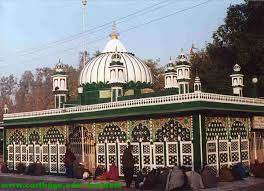
Alauddin Sabir Kaliyari was born in Kohtwaal, a town in the district of Multan in 19 Rabi al-awwal, 592 Hijri (1196). He was the son of Jamila Khatun, who was the elder sister of Baba Fareed. After his father's death, Syed Abul Rahim, his mother brought him to Pakpattan in 1204 to Baba Fareed. Baba Fareed's sister gave custody of Alauddin to him and asked him to take care of the boy, who later made him his disciple. Baba Fareed made him in charge of the langar. After a very long time, Alauddin's mother came to see him and found him very weak. She was angry at her brother and demanded an explanation. Baba Fareed explained that he was made in charge of the kitchen and hence had no food shortage. When Alauddin was asked, he replied, "True, I was made in charge of the kitchen, but I was never told I could eat from it." When asked how he managed to remain alive, he revealed he went to the jungle in his free time and ate whatever he found. He was then given the title Sabir. He reached Kaliyar Sharif in 1253 AD; after being anointed as the protector of Kaliyar Sharif by Baba Fareed, who asked him to go to Kaliyar, he stayed at Kaliyar for the rest of his life and died here in 13th Rabi al-awwal 690 Hijri (1291). Hazrat sabir was recognized for his jalal. His studies were more spiritual, and his main teacher was his peer, his uncle Baba Fareed. Over the centuries, a small town developed around the shrine and became known as Piran Kaliyar. In later history, India's first steam engine, Mary Lind (especially shipped from England moved on rails in India), ran in Roorkee on 22 December 1851, between Roorkee and Piran Kaliyar, two years before the first passenger train ran from Bombay to Thane in 1853. Operated by the Bengal Sappers, the railway line was built to carry soil used to construct the Upper Ganges Canal aqueduct from Piran Kaliyar, 10 km (6.2 miles) from the city.